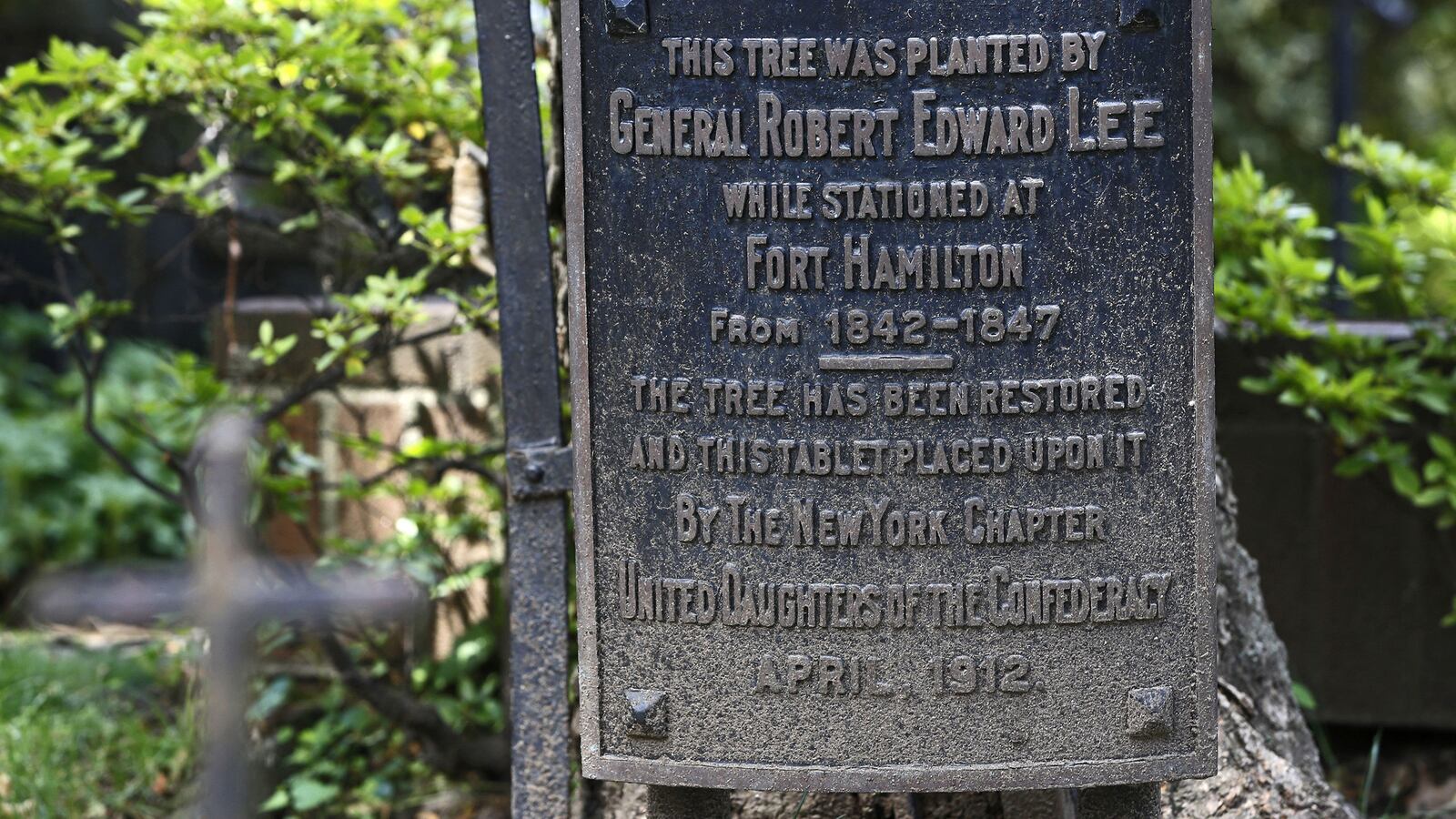As the U.S. Army appears to stiffen its resistance to renaming streets honoring the Confederate generals since Donald Trump’s election, deeming a request to do so “controversial and divisive,” New York politicians are amplifying their demands for change in the aftermath of Charlottesville.
The fight started with two streets named after Confederate generals in Fort Hamilton, the last active-duty military post in New York City located just south of the Verrazano-Narrows Bridge in the southwest corner of Brooklyn. In June, Representative Yvette Clarke wrote a letter asking the Army to rename General Lee Avenue and Stonewall Jackson Drive.
“It was unbelievable,” Clarke told The Daily Beast, of learning the names of the streets on the base, which are controlled by the Army and not mostly accessible to the public, when a staff member brought them to her attention. “Who would think that New York being squarely in the Union that there would be streets in Fort Hamilton named for two Confederate soldiers?”
In August, Diane Randon, a civilian senior official performing the duties of the assistant secretary of the Army, replied: “The men in question were honored on Fort Hamilton as individuals, not as representatives of any particular cause or ideology. After over a century, any effort to rename memorializations on Fort Hamilton would be controversial and divisive. This is contrary to the Nation’s original intent in naming these streets, which was the spirit of reconciliation.”
Ten military bases, all in the South, bear the names of Confederate soldiers, including Fort Lee, Virginia, and Fort Bragg, North Carolina.
Tuesday, Governor Andrew Cuomo sent a letter to Acting Secretary of the Army Ryan McCarthy calling on him to reconsider.
“The events of Charlottesville and the tactics of white supremacists are a poison in our national discourse, and every effort must be made to combat them,” Cuomo said in the letter. “Symbols of slavery and racism have no place in New York.”
The rejection letter Clarke received used stronger language than a similar letter to Brooklyn Borough President Eric Adams in 2015. Then, the reply simply stated that Army policy “strongly discouraged” name changes and that the Army Memorial program chose Robert E. Lee and Stonewall Jackson because of their ties to Fort Hamilton before the Civil War, when both men abandoned the Union.
Both street names, though, use the ranks the two men attained in the Confederacy. Robert E. Lee only reached the rank of Captain in the U.S. Army. And Thomas Jonathan Jackson only received the nickname Stonewall after joining the Lost Cause.
Lee first came to Fort Hamilton in 1841 where he worked as an engineer to upgrade the fort’s defenses, according to a historic landscape inventory from the U.S. Army Corps of Engineers. He then left in 1846 at the beginning of the Mexican War. Lieutenant Jackson arrived at Fort Hamilton in 1848 and served there through 1850 as an artillery officer. Both men joined the Confederacy a decade later.
It is unclear when the Army named General Lee Avenue and Stonewall Jackson Drive. Construction during the early 1950s expanded General Lee Avenue to run most of the length of the base, according to the historic landscape inventory. A map of Fort Hamilton from 1952 does not show Stonewall Jackson Drive at all.
“They need to be in history books so we can learn from them, but they cannot be symbols of praise,” Adams told The Daily Beast. “They should be symbols of where we should never go again.”
Thursday, Clarke announced a new bill—with 11 Democratic cosponsors from New York and New Jersey—to remove Confederate monuments from all military bases.
“For hundreds of thousands of Brooklyn residents, as well as troops stationed at Fort Hamilton who are prepared to fight for this nation, the monuments are an insult,” Clarke said in a statement. “It is clear that these symbols remain an inspiration to some who espouse white supremacist ideology to perpetuate acts of terror and violence on the peaceful, law abiding citizens of our nation.”
The bill itself declares that “The United States Armed Forces are essential to defending the United States and protecting American values of freedom, equality, and democratic governance.
“This role is undermined when military installations, facilities, roads, equipment, and other property are named after enemy combatants who took up arms during the Civil War to challenge the very values for which the United States stands.”






